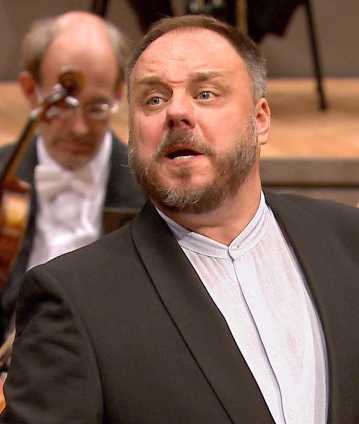Manfred Honeck and Matthias Goerne

The orchestral songs by Richard Strauss are gems in which the intimacy of the Lied is combined with virtuoso mastery of the orchestral sound. Besides the Strauss songs, Conductor Manfred Honeck and baritone Matthias Goerne, who is in demand around the world, will present Schubert Lieder in new orchestra arrangements. On the second half of the concert, you can hear Dvořák’s Eighth, a symphony which can be described as “in good spirits” – quite a rarity in the late Romantic era.
When you hear the Shakespeare setting An Silvia, you cannot but regret that Franz Schubert did not set many more texts by the English playwright to music: with instinctive sureness he sets the gallant poem to music; one could scarcely imagine another solution. Matthias Goerne commences his guest appearance with the Philharmonic with this lied, whereby the excellent Schubert interpreter has programmed the work in the orchestral version by pianist Alexander Schmalcz, premiered at Vienna’s Musikverein in mid-April 2015: “Goerne sings Schubert so that you cannot but follow him into those distant spheres where the romantic view rules. […] It is the triumph of sensitivity” (Frankfurter Rundschau). Besides Fischers Liebesglück and the Goethe lied Grenzen der Menschheit (also set for voice and orchestra), the renowned baritone with a soft timbre and admirable legato technique performs Schubert’s Litanei auf das Fest aller Seelen, based on a poem by Johann Georg Jacobi. The singer is supported on the podium by Manfred Honeck and the Berliner Philharmoniker; the conductor began his musical career as a violist with the Vienna Philharmonic before becoming Claudio Abbado’s assistant.
Matthias Goerne juxtaposes the Schubert transcriptions with genuine orchestral songs by Richard Strauss – works which (according to the music publicist Richard Specht) contain “everything fervent, zestful, child-like and at the same time lightning-quick, everything ecstatic, witty, cultivated and sensitive” from Strauss’s musical language. After the interval, Manfred Honeck makes orchestral colours shine vividly in Antonín Dvořák’s Eighth Symphony; the Austrian conductor, who has worked, inter alia, as head of the Swedish Radio Symphony Orchestra Stockholm and music director of the Staatsoper Stuttgart, and who since the 2008/09 season has held the position of music director of the Pittsburgh Symphony Orchestra, is known for his stirring interpretation of just this work. In its first two movements, Dvořák presents an almost inexhaustible abundance of themes (“the melodies just surged upon me”), the third of which is a wistful waltz, reminiscent in its sinuous melodies of ballet music by Tchaikovsky. The symphony ends with a rhythmically animated finale in which Dvořák once again pays his respects to his native folklore. The opening piece on the programme is also music by the Czech composer: Manfred Honeck has compiled an orchestral fantasy from his opera Rusalka.
© 2016 Berlin Phil Media GmbH
Related interviews
Artists
Our recommendations
- Sir Simon Rattle conducts Britten’s “War Requiem”
- Andris Nelsons and Matthias Goerne with works by Tchaikovsky and Mahler
- Stanisław Skrowaczewski conducts Bruckner
- Anne-Sophie Mutter plays Dvořák’s Violin Concerto
- Manfred Honeck and Yo-Yo Ma at the Easter Festival
- Yannick Nézet-Séguin and Lisa Batiashvili